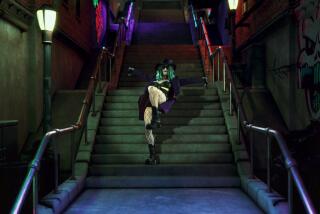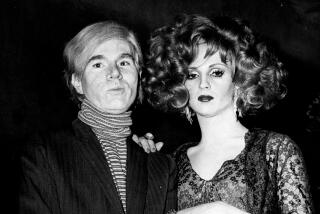Review: Tim Burton’s ‘Big Eyes’ feels too paint-by-numbers
Whether leaving his mark with the bizarre yet sweet sentimentality of “Edward Scissorhands” and “Beetlejuice,” the brilliant Oscar-nominated stop-motion animation of “Frankenweenie” and “Corpse Bride,” or the brashness of his “Batman” reboots, Tim Burton has always been one of film’s boldest visionaries. Except when it comes to women.
Unless they are of the brazen, animated variety, Burton’s female characters are generally less compelling than one might expect from the director whose unconventional imagination has delighted in countless wonderfully weird tales.
With flesh-and-blood “shes” center stage, he hesitates. As if they are too fragile, as if his outlandish ideas might be too imposing. Please, Miss, excuse my eccentricities if you will.
Burton’s latest film, “Big Eyes,” seemed like an ideal opportunity to break the pattern. Starring Amy Adams and Christoph Waltz as a codependent husband and wife so outré it’s doubtful even Burton could have dreamed them up, this seemed like a chance to avoid the rabbit hole that swallowed up his re-imagined “Alice in Wonderland,” wildly theatrical except for Mia Wasikowska’s Alice, more polite than petulant.
This film takes us into the off-kilter world of Margaret Keane (Adams), the artist whose big-eyed waifs became a ‘60s-era pop culture phenomenon. Her controlling spouse, Walter (Waltz), was an artist of a very different stripe, conning his wife into letting him take credit for her work, and suckering the world into believing it. Everywhere in the film are those Keane eyes — hugely dark, impossibly sad — framed on walls, showing in galleries, emerging, as we watch, on canvas in Margaret’s studio, behind closed doors, so no other eyes could see.
But this portrait of a woman on the verge — of success, of suppression, of submission, of rebellion — is never fully realized. For all of the turmoil around her, Margaret is too often stationed in front of a canvas in silent concentration. As was the case in the artist’s real life, her huckster husband, Walter, is allowed to hog the spotlight. Her daughter is drawn in intermittently for dramatic effect.
Perhaps some of the tiptoeing around Margaret, who is still alive and painting in real life, is due to Burton’s inability to shake the sense that those eyes were watching him. Or his habit of becoming enchanted with the ancillary characters — Helena Bonham Carter’s Red Queen in “Alice” or Michelle Pfeiffer in 1992’s “Batman Returns,” claws out and scintillating as Selina Kyle/Catwoman.
The script, written by Scott Alexander and Larry Karaszewski, who brought such quirky energy and affection to the director’s biopic about that infamous B-movie director, “Ed Wood,” is as much a sketch of a 1950s middle-class marriage as one of an artist.
“Big Eyes” begins with Margaret’s escape from her first marriage — teary-eyed, gripping her daughter with one hand, the wheel of the car with the other. Soon she’s beginning a new life in the Bay Area, falling into Walter’s arms and under his spell. Though he purports to be an artist too — Paris street scenes his specialty — he’s more con man than painter. Yet as devious as Walter is, the film leaves you wondering if the success of the work would have been as massive without him.
Margaret’s view of a woman’s place comes from a different age, just before the rising feminist tide of the 1960s would sweep the nation. The conflict is tied to her growing resentment at being dismissed — as a woman and as an artist. Dominated by men, driven by her art, as she and Walter fight about the paintings, you hear the echoes of other husbands and wives arguing about the idea of equality.
The push and pull between them — Walter increasingly controlling, Margaret fearful enough to consider fleeing — turns the story dark, while the house they live in is sun-washed light. Always such a visual director, Burton plays with the contrasting textures and tones in interesting ways.
In one of the film’s most Burton-esque scenes, the couple ends up in court with Walter playing a dandy defending himself, running back and forth between the defense table and the witness stand. The judge finally orders both of them to paint for the jury. What unfolds is a comedy within the competition, the director capturing the surreal scene exactly right.
But mostly “Big Eyes” unfolds like so many film biographies, a bit too literal and linear — then this happens, then this.
The movie does come with all of the filmmaker’s polish, the era beautifully dressed, designed and shot by a first-class crew led by cinematographer Bruno Delbonnel, production designer Rich Heinrichs and an inspired Colleen Atwood, like Heinrichs, a frequent collaborator on Burton projects.
Adams is affecting in playing subservient, eyes uncertain, lips quivering. But somehow it still feels too safe, without the same emotional risks that characterize her work, a wide range including last year’s sexy, smart moll in “American Hustle” and handling that hot stove in “Julie & Julia” with Meryl Streep.
In contrast, Waltz takes Walter to extremes, quite irritating in his demanding entitlement, the smile plastered on. The sly sensibility the actor has brought to other florid characters — a Nazi colonel in “Inglourious Basterds,” a brazen bounty hunter in “Django Unchained” — is shelved.
Both Adams and Waltz received Golden Globe nominations for their efforts, but were bypassed by the Screen Actors Guild.
Suburban America in the late 1950s and early ‘60s is a period Burton is fond of nosing around in. In teasing out all the nuances of Margaret’s situation, the director channels the conformity better than the ambition and need that drive her.
In that sense, “Big Eyes” is Burton’s most down-to-earth work yet, as conventional as the times. Not nearly as unorthodox as its subject, or the director himself.
------------
‘Big Eyes’
MPAA rating: PG-13 for thematic elements and brief strong language
Running time: 1 hour, 46 minutes
Playing: In general release
More to Read
Only good movies
Get the Indie Focus newsletter, Mark Olsen's weekly guide to the world of cinema.
You may occasionally receive promotional content from the Los Angeles Times.







